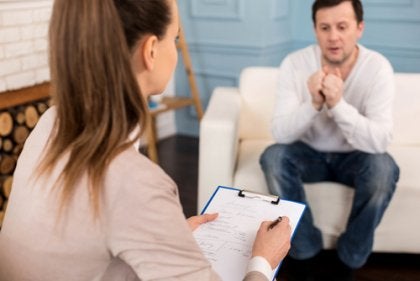Venustraphobia: The Fear of Beautiful Women

The world of phobias is immense, varied, and truly fascinating. There are many types of phobias out there, from the classic arachnophobia to the complex hippopotomonstrosesquippedaliophobia, the fear of long words. Among the rarest phobias, you’ll find venustraphobia, the fear of beautiful women.
People who suffer from venustraphobia or caligynephobia are afraid of women they find attractive. The mere presence of an attractive woman is enough to cause intense feelings of fear and anxiety. They don’t necessarily even need to interact with the woman directly. Nor do they need to have taken any kind of special emotional or sexual interest in the object of their phobia.
The term venustraphobia is a combination of the word Venus (the Roman goddess of love, beauty, and fertility) and the word phobia, meaning fear.
As you already know, a phobia is an intense and irrational fear. The person will often go to great lengths to avoid the thing that scares them. Those who can’t avoid the object of their phobia often live with constant feelings of great anxiety.
Venustraphobia is generally more common in heterosexual men, although there have also been cases in homosexual and heterosexual women. It can also occur in both adults and children.

Signs and symptoms of venustraphobia
As we’ve already mentioned, the main symptoms of phobias in general, and venustraphobia specifically, include excessive and irrational fear of a phobic stimulus, which, in this case, is a woman the person finds attractive.
This fear is usually accompanied by avoidance behaviors and feelings of great anxiety and discomfort. The person may also experience the following symptoms:
- Tachycardia (accelerated heart rate).
- Shivers.
- Shaky legs.
- Cold sweats.
- Stuttering.
- Irrational thoughts regarding the amount of danger associated with being close to an attractive woman.
- In serious cases, they may also suffer from dizziness, nausea, and even vomiting.
Like many phobias, venustraphobia can have a massive impact on the lives of those who suffer from it and can become hugely limiting.
Once a person suffers from one episode of venustraphobia, it can often lead to the development of anticipatory anxiety. This means that the person will try to avoid any situation in which they might meet an attractive woman, to the point where they may cut themselves off from others entirely.
What causes venustraphobia?
While the origins of venustraphobia aren’t entirely clear, and seem to be multicausal in nature, it’s believed that it may be the result of traumatic childhood experiences.
These experiences can range from a divorce or a bad breakup to living with a negligent, indifferent, or abusive mother. In this case, the person comes to associate beautiful women with pain, suffering, and discomfort.
In the case of heterosexual men and homosexual women, this phobia may be more common among those who are shy, and those who struggle with low self-esteem or feelings of inferiority.
These people often find it embarrassing to interact with attractive women, for fear that they may mock them or show them up. In heterosexual women, venustraphobia can stem from feelings of competitiveness.
Treatment of venustraphobia
The best form of treatment for any phobia is progressive exposure to the feared stimulus. This involves the patient making a list of all the situations that make them feel uncomfortable, putting them in ascending order. Then, they can gradually start to expose themselves to each of these situations.
In doing so, the person will slowly start to get used to the fear they feel in these situations. These feelings should decrease as they discover that none of their fears come true.
If, at any point, the person becomes overwhelmed by feelings of fear, or suffers an anxiety attack, they should be allowed to remove themselves from the situation. However, this should only be temporary – the session should resume as soon as possible.
Experts advise teaching patients relaxation and breathing techniques that they can use in situations where they feel intense fear. This gives them coping strategies that they can use instead of simply leaving. However, it’s important to make sure that these techniques don’t become a form of covert avoidance.
Therapists should also try to pinpoint the irrational beliefs and cognitive distortions that lead the patient to feel like they’re in extreme danger. These thoughts can be addressed with cognitive techniques, and by helping them to think more rationally about the situation. This can be done by encouraging them to search for concrete evidence to help them determine the veracity of these thoughts.
Treating related disorders
If the venustraphobia has become so limiting that the person has developed a social anxiety disorder, this must also be addressed. It isn’t enough to simply treat the phobia alone.
This also applies to cases where the patient has developed depression. In such cases of comorbidity, the only way to improve the person’s overall quality of life is to treat the symptoms of both disorders.
“Fear is always willing to see things worse than they are.”

Reflection
We live in a world in which the human form is revered, and beauty standards are often unattainable. Physical attractiveness is sometimes considered one of the most important symbols of success. These pressures give rise to certain beliefs, including, for example, the idea that an attractive woman must find a partner who’s at least as attractive as she is.
Comparing ourselves with one set ideal of beauty often leaves many of us feeling down, and can have a huge impact on our self-esteem. Each of us must learn to appreciate our unique qualities. Traits we consider our imperfections are often things other people admire about us.
We need to remember that physical beauty doesn’t last forever. When you’re old and gray, and the beauty of youth is far behind you, your heart and soul will remain the same.
This text is provided for informational purposes only and does not replace consultation with a professional. If in doubt, consult your specialist.








